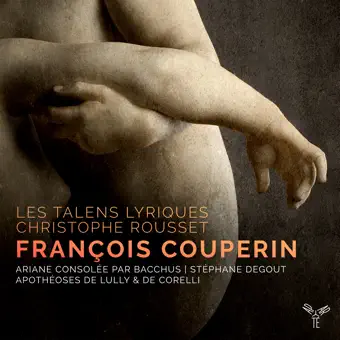december 2016
Couperin: Ariane consolée par Bacchus, Apothéoses de Lully & de Corelli
Les Talens Lyriques o.l.v. Christophe Rousset
‘Een mijlpaalopname om te koesteren’, schrijft onze criticus, en hoewel deze verloren cantate een must-hear is voor Couperin-liefhebbers, is de sfeervolle uitvoering dat ook voor iedereen.

Hier kunnen we voor het eerst horen wat een verloren cantate van François Couperin lijkt te zijn. Talrijke van zijn wereldlijke airs, chansons en canons zijn bewaard gebleven in manuscript en druk, maar tot nu toe is geen van de cantates waarvan bekend is dat ze bestonden ten tijde van zijn dood (1733) gevonden. Roussets overtuigende argument voor het toeschrijven van dit anonieme manuscriptwerk, tot nu toe alleen bekend van een Amsterdamse catalogusvermelding uit 1716 als ‘Ariane abandonée’, is, geloof ik, overtuigend.
Deze Ariane consolée par Bacchus is, enigszins ongebruikelijk, voor een bariton. Hoewel Stéphane Degout het meest bekend is als operazanger en recitalist van later repertoire, past hij zijn stem aan het gevarieerde tempo binnen de recitatieven aan en drukt hij woorden uit als ‘douceur’ in de eerste Air en de tongbrekende tekst van de ritournelle in de laatste Air met de lichtste toets. Bovendien laat de akoestiek van de Eglise Saint-Pierre (Parijs) ons genieten van zowel de warmte van zijn stem als de details van zijn vloeiende versieringen. De aanwezigheid van Christophe Coin die de concertante basvioolpartij in deze tracks speelt, draagt verder bij aan het plezier dat u beleeft aan het luisteren naar deze moderne première.
De overige werken op de schijf werden opgenomen in de uitzonderlijke akoestiek van het voormalige 14e-eeuwse klooster Les Dominicains de Haute-Alsace. Couperins vermakelijke paar apotheosen die aan Lully en Corelli zijn toegekend, zijn bijna uniek in het repertoire vanwege zijn 'bijtende' programmatische commentaren, hier elegant uitgevoerd door Rousset vanaf het klavier. Deze werken zijn vele malen opgenomen, maar zelden zo goed. Roussets visie voor zijn ensemble van hobo's, fluiten, violen en viola da gamba is subliem, net als zijn klavecimbelrealisaties. Dit is een mijlpaalopname om te koesteren.

Here, for the first time, we can hear what appears to be a lost cantata by François Couperin. Numerous of his secular airs, chansons and canons survive in manuscript and print, but until now none of the cantatas known to have existed at the time of his death (1733) have been found. Rousset’s cogent argument for attributing this anonymous manuscript work, hitherto known only from a 1716 Amsterdam catalogue entry as ‘Ariane abandonée’, is, I believe, compelling.
This Ariane consolée par Bacchus, somewhat unusually, is for a baritone. Although best known as an opera singer and recitalist of later repertoire, Stéphane Degout adjusts his voice to the varied pace within the recitatives and expresses words such as ‘douceur’ in the first Air and the tongue-twisting text of the ritournelle in the final Air with the lightest touch. Moreover, the acoustic of the Eglise Saint-Pierre (Paris) allows us to enjoy both the warmth of his voice and the detail of his fluent ornamentation. The presence of Christophe Coin playing the concertante bass viol part in these tracks adds further to the pleasure to be had from listening to this modern premiere.
The remaining works on the disc were recorded in the exceptional acoustic of the former 14th-century monastery Les Dominicains de Haute-Alsace. Couperin’s entertaining pair of apotheoses accorded to Lully and Corelli is almost unique in the repertoire because of his ‘acerbic’ programmatic commentaries, elegantly delivered here by Rousset from the keyboard. These works have been recorded many times but rarely so well. Rousset’s vision for his ensemble of oboes, flutes, violins and viol is sublime, as too are his harpsichord realisations. This is a landmark recording to treasure.
